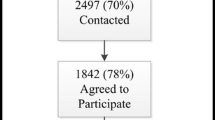Abstract
Background
Non-directive counseling is a key component of physician-patient interactions, yet adequate education on this topic is limited in medical education. In this study, we examined whether students would have bias or instead would use non-directive counseling in the specific example of genetic testing for Huntington’s disease.
Methods and Findings
First-year medical students were surveyed if they would personally obtain genetic testing and how they would counsel patients in the following three clinical genetic testing scenarios: pre-symptomatic, diagnostic, and prenatal. Student recommendations were analyzed for how many students picked the standard practice of care extrapolated from the technical standards of the Huntington’s Disease Society of America. Fifty-one of ninety-two students (55.4 %) correctly remained neutral for their counseling of patients regarding pre-symptomatic testing. Sixty-eight of ninety-one students (73.9 %) correctly encouraged genetic testing in the diagnostic clinical scenario. Twenty-nine of ninety-two students (31.5 %) correctly remained neutral for counseling on prenatal testing when the patient would terminate her pregnancy if the fetus were found to have HD. Twenty-two of ninety-two students (23.9 %) correctly discouraged testing when the patient would not terminate her pregnancy.
Conclusion
The results suggest that students may lack the expertise needed to appropriately counsel patients for genetic testing. This may possibly be due to personal bias, which was especially evident in the prenatal testing scenario. Students would benefit from further training to understand how to analyze a variety of commonly encountered clinical scenarios in order appropriately provide non-directive counseling that preserves patient autonomy.
Similar content being viewed by others
References
Pennacchini M, Pensieri C. Is non-directive communication in genetic counseling possible? Clin Tera. 2011;162(5):141–4.
Elwyn G, Gray J, Clarke A. Shared decision making and non-directiveness in genetic counseling. J Med Genet. 2000;37:135–8.
Bartels DM, LeRoy BS, McCarthy P, et al. Nondirectiveness in genetics counseling: a survey of practitioners. Am J Med Genet. 1997;72:172–9.
Yarborough M, Scott JA, Dixon LK. The role of beneficence in clinical genetics: non-directive counseling reconsidered. Theoret Med. 1989;10(2):139–49.
Craufurd D, MacLeod R, Frontall M, et al. Diagnostic genetic testing for Huntington’s disease. Pract Neurol. 2015;15:80–4.
Frank S. Treatment of Huntington’s disease. Neurotherapeutics. 2014;11(1):153–60.
Myers R. Huntington disease genetics. NeuroRx. 2004;1:225–62.
Tibben A. Predictive testing for Huntington disease. Brain Res Bull. 2007;72(2–3):165–71.
Schuffham TM, MacMillan JC. Huntington’s disease: who seeks presymptomatic genetic testing, why and what are the outcomes? J Genet Couns. 2014;23(5):754–61.
Toufexis M, Gieron-Korthals M. Early testing for Huntington’s disease in children: pros and cons. J Child Neurol. 2010;25(4):482–4.
Carresse JA, Malek K, Watson K, et al. The essential role of medical ethics education in achieving professionalism: the Romanell Report. Acad Med. 2015;90(6):744–52.
Nance M, Myers R, Wexler A, and Zanko A. Genetic Testing for Huntington’s Disease: Its Relevance and Implications. United States Huntington’s Disease Testing Group. 2001. Accessed from http://hdsa.org/wp-content/uploads/2015/03/GeneticTesting-for-HD.pdf on August 25, 2016.
Kromberg JG, Wessels TM. Ethical issues and Huntington’s disease. S Afr Med J. 2013;103(12):1023–6.
Brennan MJ, van der Westhuyzen J, Kramer S, et al. Neurotoxicity of folates: implications for vitamin B12 deficiency and Huntington’s chorea. Med Hypotheses. 1981;7(7):919–29.
Fletcher JC, Evans MI. Ethics in reproductive genetics. Clinic Obstet Gynecol. 1992;35(4):763–82.
Minkoff H, Marshall MF, Liaschenko J. The fetus, the “potential child,” and the ethical obligations of obstetricians. Obstet Gynecol. 2014;123(5):1100–3.
Acknowledgments
We thank Dr. Samuel Frank and Dr. Richard Myers for advice on initial survey design. We thank Dr. Janice Weinberg and Denis Rybin for statistics consultation. We dedicate this study to Meghan Sullivan and the entire Sullivan Family for their contribution to the Medical Genetics course and inspiration for this study.
Author information
Authors and Affiliations
Corresponding author
Ethics declarations
Declarations of Interest
The authors declare that they have no competing interests.
Electronic Supplementary Material
ESM 1
(DOC 35 kb)
Rights and permissions
About this article
Cite this article
Mundluru, S.N., Therkelsen, K.E., Verscaj, C.P. et al. Conflicts Between Non-Directive Counseling and Unbiased Patient Care: the Influence of Medical Students’ Personal Beliefs on Proposed Huntington’s Disease Genetic Testing Recommendations. Med.Sci.Educ. 26, 639–646 (2016). https://doi.org/10.1007/s40670-016-0322-z
Published:
Issue Date:
DOI: https://doi.org/10.1007/s40670-016-0322-z




